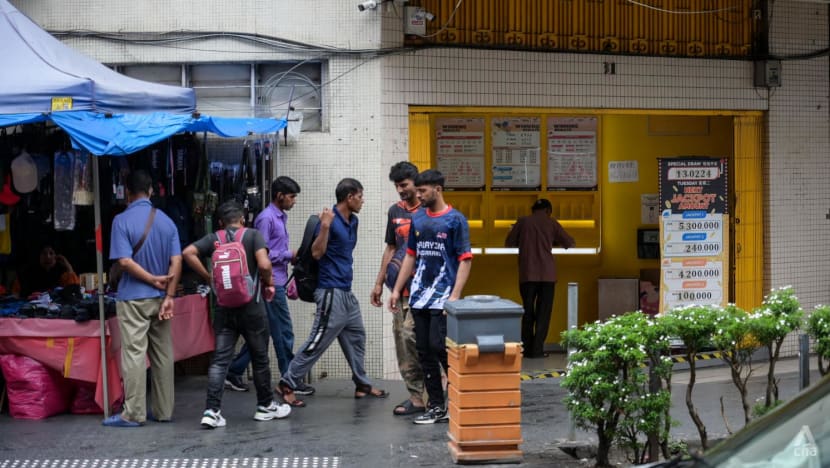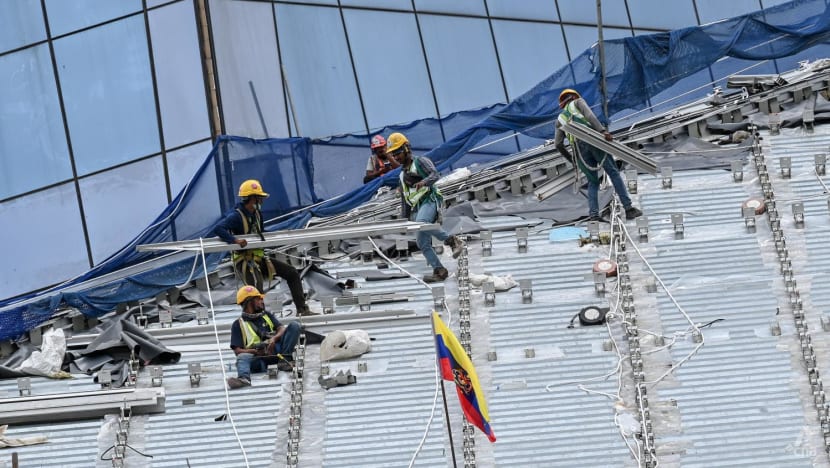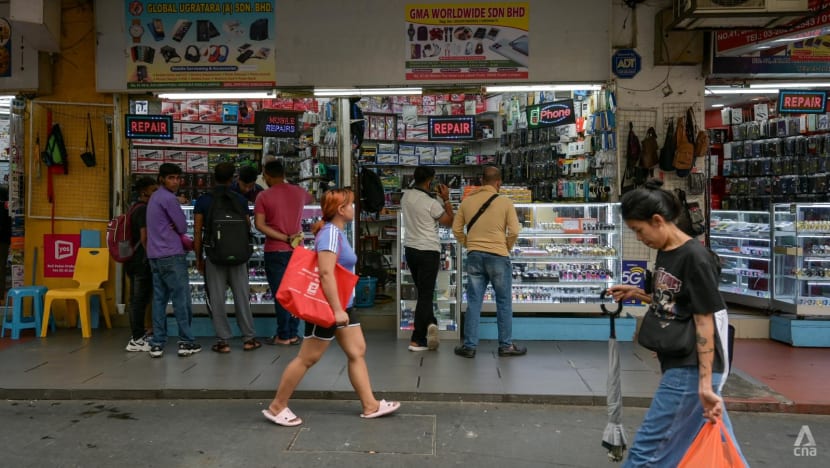'Limit their numbers': Malaysia’s scammed, jobless migrant workers problem highlights its foreign labour dependence
Traditionally labour-intensive industries urged the government to give them more time to automate their processes and attract more locals to what would hopefully be higher-paying jobs.

In Kuala Lumpur, migrant workers frequently visit Jalan Silang near Petaling Street to shop for necessities. (Photo: CNA/Fadza Ishak)

This audio is generated by an AI tool.
SINGAPORE: While Malaysia has vowed to make fresh efforts to reduce its reliance on foreign workers, continued reports of scammed and jobless migrant workers in the country show the government faces a tough task ahead, industry observers said.
In December last year, Economy Minister Rafizi Ramli said the government will make reducing foreign labour dependence a “priority” in 2024 in a bid to create higher-paying jobs for locals and drive Malaysia’s economy up the value chain.
However, reports on Dec 20 that 171 Bangladeshi workers in Kota Tinggi, Johor were duped into entering the country on the promise of jobs and now remain unemployed illustrate Malaysia’s deep-seated issues with foreign workers.
“There is a huge number of job scams that are happening where workers are trafficked to Malaysia without jobs but using formal working visas,” said Mr Adrian Pereira, executive director of migrant right’s group North-South Initiative.
“That skews the labour environment in the sense that you may not be prioritising Malaysians because you have a ready workforce - whether documented or undocumented - who is willing to do work at a cheaper rate and with longer hours.”
Malaysia’s roughly 2.2 million migrant workers make up about 15 per cent of its 15 million workforce, already at the maximum proportion set by the government under its 12th Malaysia Plan But unofficial estimates say the country has millions more undocumented migrant workers, according to the UN’s International Organization for Migration.
The government has frozen the hiring of new foreign workers, although some labour-intensive industries - like cleaning and plantation - continue to struggle with manpower shortages.
Malaysian Trade Union Congress (MTUC) secretary-general Kamarul Bahrin Mansor told CNA he continues to receive reports of foreign workers who arrive in Malaysia with promises of jobs that fall through.
Such labour-related incidents tarnish Malaysia’s image and affect investment, he said, noting the perception that the business of bringing in foreign workers was a “gold mine” for deceptive agents and corrupt government officials. “We are concerned and urge the government to take stern action on this,” Mr Kamarul said.
The government has made moves on this front: In May last year, three government officials attached to then-Human Resource Minister V Sivakumar’s office were arrested as part of an anti-graft probe into the recruitment of foreign workers. Mr Sivakumar was also questioned by the Malaysian Anti-Corruption Commission, local media reported, though he has claimed he is not a suspect in the investigations.
In his first Cabinet reshuffle last month since taking office in November 2022, Prime Minister Anwar Ibrahim dropped Mr Sivakumar from his post.
How do foreign workers end up stranded in Malaysia without promised jobs?
A UN International Organization for Migration report published in August last year said migrant workers in Malaysia could become undocumented because they face exploitation, abuse and unethical recruitment practices throughout the employment process, including the withholding of their passports.
According to the study, which interviewed 40 migrant workers, some paid up to US$5,000 in recruitment fees and migration-related costs and were promised a job verbally.
But on arrival, they discovered that the recruitment agencies had made false promises regarding the terms and conditions of employment, meaning they were deceived and unprepared for their actual living and working conditions.
While most of the workers arrived on a calling visa - a short-term visa typically issued to people who are invited by a Malaysian company or organisation to participate in business-related activities - the wait time to obtain a work permit in order to work legally in the country was three months on average.
Some waited longer, during which they struggled to finance living costs, repay migration-related debts, and save or remit funds to their families back home, the report said.
Mr Adrian Pereira, executive director of Malaysian migrant right’s group North-South Initiative, told CNA that “human traffickers” - referring to the recruitment agencies - had masqueraded as employers to bring in migrant workers and outsource them to other companies.
“The government has banned outsourcing in 2019, so by right there shouldn’t be any workers brought in unless jobs have been confirmed,” he said.
Malaysia Association of Cleaning Contractors president Noruddin Idris claimed that some of these “recruitment agencies” made photocopies of legitimate contracts awarded to other cleaning companies and manipulated them to pass off as their own.
These contracts were then used to dupe the authorities into allowing them to apply to bring in foreign workers.
“As long as the workers come in, they will get money. So once the workers get here, whether they have a job or not, that’s their problem,” Mr Noruddin told CNA.
Last June, Home Minister Saifuddin Nasution Ismail told reporters that 1,120 foreign workers who entered the country under the Foreign Worker Employment Relaxation programme had been classified as unemployed.
The programme, which loosened rules for hiring foreign workers, was implemented at the start of 2023 to help struggling industries meet manpower demand as the economy reopened post-pandemic.
Mr Saifuddin described the workers’ plight as a foreign labour dumping issue, saying that most of them were from Bangladesh and had been brought in to work in the cleaning and washing industry.
He said authorities had identified the recruitment agencies or employers involved in bringing in the workers, and would take action - including blacklisting - against them.
In the recent case of the Bangladeshi workers who were duped and remain jobless in Johor, authorities said on Jan 6 that the company that brought them in has been blacklisted from making new foreign worker employment applications and will be dealt with under relevant laws.
"The Home Ministry and the Human Resources Ministry take this matter seriously and will not compromise with any party involved in exploiting foreign workers, leading to forced labour and human trafficking," the ministries said in a joint statement.
Meanwhile, Mr Kamarul also pointed out that past administrations have tried to reduce dependence on foreign workers but failed, citing how Malaysia introduced its minimum wage in 2012 in part to achieve this aim, but with limited results.
The current monthly minimum wage is RM1,500 (US$323).
“The minimum wage didn’t work; the government is always saying the same thing. We have become numb to their words, so whichever minister says it, we know it’s just political talk,” he said.
“So, we hope Mr Rafizi is serious about his words.”
Mr Kamarul said it is important that Malaysia is serious about cutting its dependence on foreign workers as this would help its economy transition from labour-intensive to automation-focused, spurring development.
“We know that foreign workers have made big contributions to Malaysia’s development, but we need to limit their numbers as there are few job opportunities and many of our people don’t have jobs,” he added.
ARE LOCALS WILLING TO TAKE UP “3D” JOBS?
Industry players told CNA they accepted the government’s intentions to reduce reliance on foreign workers but called for more time to invest in automation and upgrade workers’ skills in hopes to make “3D (dirty, dangerous and demeaning)” jobs more attractive for locals.
In tabling the mid-term review of the 12th Malaysia Plan last September, Mr Anwar said the government will implement a multi-tiered levy system that charges higher rates for companies with more foreign workers.
The Economy Ministry is also piloting a progressive wage model from June this year aimed at improving the wages and working conditions of low-income workers, tied to how these workers acquire new skills.
On Dec 25, Mr Rafizi acknowledged on social media that some employers insist local workers do not want to work in certain industries.
“A part of it is the issue of wages, but with the minimum wage, wages are higher compared to last time,” he wrote on X.
Mr Kamarul said it was a “myth” that local workers shun such jobs, highlighting that some Malaysians were willing to wake up at 4am to cross into Singapore and work as cleaners for a larger paycheck.
“These jobs must be beneficial in that they must use technology and give higher pay. With that, I believe local workers can take over foreign workers,” he added.

Malaysia Association of Cleaning Contractors president Noruddin Idris feels local workers could be persuaded into joining the cleaning industry if its jobs paid better and involved more automation, like operating cleaning robots.
But he questioned if consumers were willing to pay more for these higher-quality services, pointing to how cleaning seems to be perceived as a low-priority service in Malaysia with acceptance of substandard work.
The government has announced plans to introduce performance-based cleaning contracts, where contracts are awarded based on whether cleaning companies can meet higher cleaning standards, including with the use of technology.
Currently, cleaning contracts are based on the number of employees supplied and the frequency of cleaning conducted.
On their end, cleaning contractors need to ditch a mentality of always trying to reduce costs to win contracts with the lowest bid, Mr Noruddin said.
“Even if they reduce manpower, they will still want to use conventional systems and not invest in new tech,” he said, noting that it will take one to two years for them to realise that contract values will only go up if they do higher-quality work.
“There is a possibility of the government succeeding this time (in reducing foreign labour dependence), but it will take a little bit of time.”
EMPLOYERS ASK FOR MORE TIME
The Malaysian Employers Federation (MEF) said it supports the government’s policy of reducing reliance on foreign workers, but urged any measures to be done in stages and not implemented abruptly.
MEF president Syed Hussain Syed Husman recounted the “bitter experience” of April 2022, when employers suffered “huge losses” due to a shortage of workers as the economy reopened following the pandemic.
At the start of 2023, the government introduced two temporary programmes to meet this demand: One to relax rules for hiring foreign workers, and another to issue work permits to undocumented migrant workers.
Mr Sivakumar - the former human resources minister - previously said that based on the 12th Malaysia Plan, the number of foreign workers should not exceed the projection of 2.4 million individuals until 2025 but the latest figure had hit this threshold.
This includes those already present as well as the increase in numbers from the two programmes, he told local media in December. The programmes have since ended.
But Mr Syed Hussain believes it is unrealistic for employers to reduce their reliance on foreign labour by 2025, calling for a longer timeframe for companies to embrace new technology.
“One year is too short a time for employers to digitalise their processes, automate and mechanise, and they still require foreign workers for the time-being to continue with their operations,” he said.
“As embracing new technology is expensive, the government must assist micro, small and medium enterprises (MSME) to adopt digitalisation, automate and mechanise.”
SME Association of Malaysia national secretary-general Chin Chee Seong said abrupt changes and a lack of workers will force SMEs to shelve expansion plans and deter investment in Malaysia.
“The government could also be more transparent and realistic in approving applications for foreign workers, especially for industries that really need it,” he said, referring to the stranded foreign workers in Johor as one example of how the approval process needs to be reviewed.

Likewise, Federation of Malaysian Manufacturers president Soh Thian Lai urged the government to address inefficiencies and improve administrative processes and procedures in its foreign worker employment system.
Mr Soh stressed that foreign labour cannot be immediately eliminated as they still support the manpower needs of the manufacturing sector, even as it transitions to more high-technology and value-added activities.
According to Department of Immigration statistics as of Oct 31 last year, the manufacturing sector employs almost 650,000 foreign workers, making up more than 35 per cent of its workforce.
This is the highest proportion of any sector, ahead of construction (26.3 per cent) and agriculture and plantations (21.1 per cent).
Amid the national movement to reduce reliance on foreign labour, Mr Soh said the manufacturing sector needs enough time to adjust and plan operational and financial requirements, including budgets, product pricing and investment decisions.
“It is therefore important that the government in their stride towards reducing reliance on foreign labour ensures that the legislations, policies and procedures relating to foreign labour in the country be fair, certain, transparent and pre-announced,” he told CNA.
BUY-IN NEEDED FROM ALL STAKEHOLDERS
With that said, MTUC’s Mr Kamarul suggested that the pressure from some industry associations has caused previous governments to shift its stance on reducing foreign worker numbers several times.
“In my own opinion, I’m not so confident that the government will achieve it,” he said, noting that it has to start with political will and continue with concerted effort no matter how long it takes.
According to a June 2021 report published by Malaysia-based think-tank The Centre, the country’s long-term goal of reducing dependence on migrants is frequently undermined by contradictory short-term policies, leading to the accumulation of a high number of legal and illegal migrant workers.
“Malaysia needs to make a clear break from cyclical recruitments and round-ups towards a more long-term migrant worker policy, rooted in clear sectoral planning as well as residency privileges,” the report said.
Mr Lee Heng Guie, an economist and executive director of the Socio-Economic Research Centre, said the policy’s success requires the buy-in of the government, industry players, employer and employee.
A good starting point would be to look at details of the multi-tiered levy system and how effective it is in deterring the excessive hiring of foreign workers, he said.
“In the beginning, companies wouldn’t mind paying a bit more, but they will reach a point where they find that it’s worthwhile to start looking into automation and investing more in scaling up technology,” he added.
“Long term, that would be better for them in terms of costs and attracting local workers.”


















